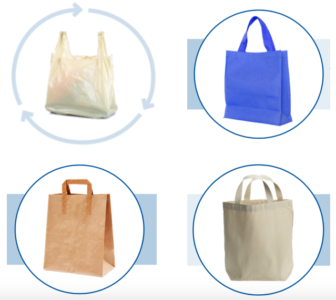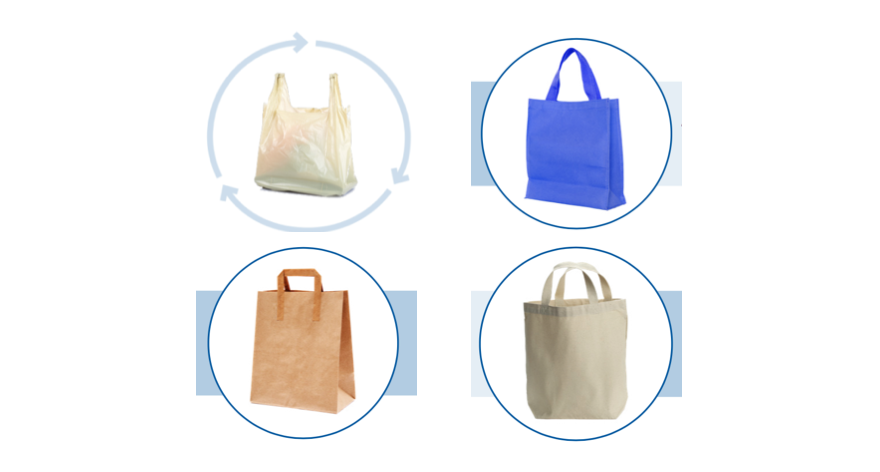A new Connecticut law to reduce single-use plastic bags in the state goes into effect today, Thursday, Aug. 1.
Under the state law, whenever state and local rules about checkout bags exist, the stricter parts of those laws applies.
Beginning this day, Connecticut shoppers will be charged a 10¢ fee for every single-use plastic bag (not including paper bags) until they are phased out altogether in the summer of 2021.
 The provisions of Public Act 19-117, § 355 are effective today through June 30, 2021, after which single-use plastic checkout bags will be banned.
The provisions of Public Act 19-117, § 355 are effective today through June 30, 2021, after which single-use plastic checkout bags will be banned.
The idea is to cut down on one of the main contributors to marine pollution. (Many also support it in order to cut down on litter.)
Under the new law, stores must indicate the number of single-use plastic checkout bags provided, as well as the total amount of the fee charged, on any store receipt given to a customer.
“’Single-use checkout bag’ does not include: (a) a paper bag; (b) a reusable plastic bag (four mils [a mil is a thousandth of an inch] or thicker); (c) a bag provided prior to checkout that is used only to contain meat, seafood, loose produce or other unwrapped food items; (d) a newspaper bag; or (e) a laundry or dry cleaning bag,” according to a description of the law on the state Department of Revenue Services website.
When a local government enacts a bag ordinance, before or after the state’s new law, the stricter parts of the ordinance still apply, so consumers may find other restrictions on bags when they shop outside of Darien.
Shoppers will find some parts of Darien’s new checkout bag ordinance are also stricter than the state’s.
— The article above was adapted from this article published by GreenwichFreePress.com.
How Darien’s Checkout Bag Ordinance and State Law Works
On June 12, Darienite.com published an article about how the town and state checkout bag rules will be phased in. Here’s a summary, as Representative Town Meeting member Monica McNally described it to the RTM:
- AUG. 1 — “State law will require, when you go to the store, you pay a 10-cent tax on any [single-use] plastic bag.
- JAN. 1, 2020 — “The Darien ordinance will require stores of over 10,000 square feet to no longer provide single-use plastic bags and to charge 10 cents for the compliant paper bag.” (Those “compliant” paper bags will have to be recycled, with at least 40 percent of post-consumer content.)
- JAN. 1, 2021 As of this date, “no Darien store, regardless of size, will provide single-use plastic bags, and all stores will offer only compliant, reusable […] paper bags. The stores over 10,000 square feet will continue to charge 10 cents.” Smaller stores won’t have to charge 10 cents.
- JULY 1, 2021 — The state will prohibit all stores from giving out single-use plastic bags (six months after they’re banned in Darien). The state defines single-use plastic bags as 4 mil thick (4 thousandths of an inch) or less.
Businesses can also sell reusable plastic checkout bags, but they’ll will need to be at least 12 mil (12 thousandths of an inch) thick. Darien’s regulation on charging 10 cents per bag is meant to make sure that people are nudged into remembering to bring in their own reusable bags, McNally said.
Ultimately, she said, the purpose of the ordinance is to get people to take their bags with them into the store. When stores provide only paper bags, those will be more expensive to buy and more pollution will be created by their use than plastic bags create, McNally said — but if they become litter, they’ll decompose relatively quickly.
Darien was much more lenient with smaller stores (those with less than 10,000 square feet of space — enough for a store 100 feet from back to front and 100 feet from side to side), but state law made no distinction between smaller and larger stores. That means smaller stores will get a bit more time before the state law goes into effect.
“One of the main takeaways from the second public hearing is that the 38 stores [in town] that are under 10,000 square feet — that’s about 86 percent of our retail stores — these stores play a very small part in the distribution of single-use plastic bags, and they were not in favor of the mandatory fee,” McNally said.

